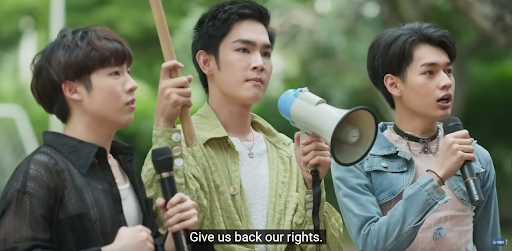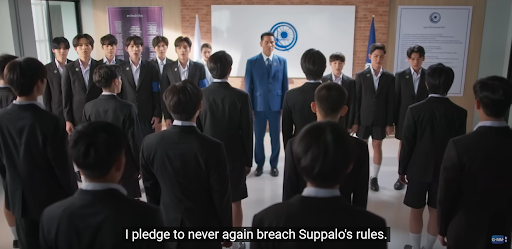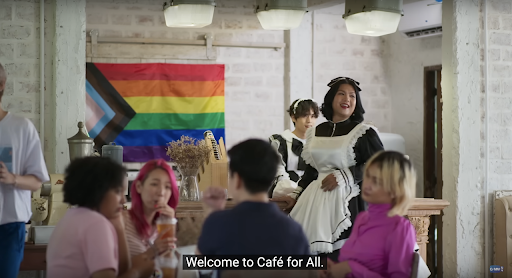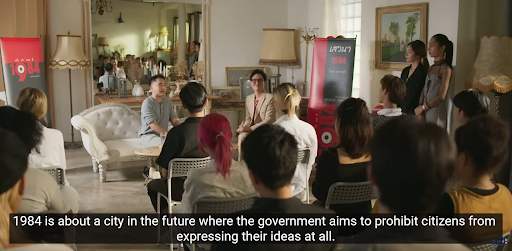Is The Eclipse an Allegory of an LGBTQA+ Experience in an Authoritarian Society?

The Thai BL series is showing something that Western media hasn't been able to give us so far.
Thailand's BL industry has already confidently established its highest position in the worldwide queer media ranks; meanwhile, in real life LGBTQA+ community doesn't have many rights, even the same-sex marriage is still illegal in this country. Different TV shows, such as Not Me and Vice Versa, have already pointed out this oxymoron in the past couple of years. Other series have also addressed queer people's experience living in Thai society in a more subtle way. One of these shows is The Eclipse by GMMTV which started airing this year.
The Eclipse is a novel-based show about a prestigious all-boy school Suppalo with particularly strict rules controlling every aspect of its students' lives, from wearing uniforms and accessories to expressing their own opinions and beliefs. On one side, you have Akk, the head of the prefects, who obeys teachers and enforces the school's rules on students with his friends' help. On the other side, you have an openly queer trio of students protesting under the name of The World Remembers gang and demanding their right to be themselves, and a mysterious new kid Ayan who thinks following old rules is ridiculous. He is investigating his uncle's death which is somehow connected to the Suppalo school and its repressing environment.

The first episode of The Eclipse left everyone wondering if they were reading the signs right. The following episodes confirmed a powerful "queer people vs authorities" metaphor being a core theme of the whole series.
This metaphor is consistently expressed in the students mentioning the eclipse curse that punishes everyone who dares to break Suppalo's rules. There are gender non-conforming and gay protesters whose lives have already been threatened by "the curse", a student with internalized homophobia who can't admit having feelings for his classmate (unsurprisingly, he is the one most afraid of the curse). In addition, the already mentioned new kid challenges the system and uses flirting as a way of fighting back against the head prefect who is losing his own identity trying to uphold the school's reputation and enforce the rules on all students.
The teachers don't allow students to express their own opinions on Thailand's history or talk back to them. They punish everyone who dares to step out of line, even banning phones as means of spreading information and physically taking away the megaphones and cameras from the students who fight for their voices to be heard. They force everyone to wear uniforms as a sign of power, forbidding students from expressing their personalities. The prefects feel like a cult, watching everyone like hawks and keeping them in line.

Soon enough, viewers fully grasp the meaning of the subtext, connecting following Suppalo's rules being equal to heteronormativity and traditional society as the only appropriate system. In The Eclipse, people in power control gender, and students themselves control the traditional understanding of love, and many fans have noted that this series has been confidently breaking the limitations of the Boy Love genre so far.
"The Eclipse walks such a perfect line of being both a queer BL and representing so accurately and diversely queer experiences with high school homophobia (both internal and external) while also being a soft, sweet romcom AND having a splash of mystery series thrown in!" – @Kell
As the show goes on, the main topic is addressed more explicitly. The Eclipse's characters are introduced to Cafe for All – a safe space for all people regardless of their gender or sexual orientation. The café is introduced as the first place out of Suppalo school where we learn more about characters' struggles, see them opening up to each other and sharing what's troubling them.

Another notable symbol supporting the theme of rebelling against the authoritarian regime is a famous book 1984 by George Orwell which is read and discussed by two main characters. 1984 is a dystopian novel showing the life of a brainwashed citizen who is being oppressed and controlled by the government, which forbids anyone to express their thoughts, love, or individuality.

It seems like all of the abovementioned symbols, discussions, and metaphors shown in The Eclipse are deliberate choices of the director. Tanwarin Sukkhapisit, also known as Golf, is a non-binary filmmaker, writer, and politician who was elected as a member of parliament and became Thailand's first openly transgender person in the House of Representatives. However, Golf was removed for allegedly being queer and pro-democracy, and fans find it interesting and fascinating that such similar topics have become the main theme of The Eclipse series. It should be noted as well that the producer of the show is Noppharnach Chaiwimol, also known as Aof, an openly gay man famous for directing the Bad Buddy series which also contains a subtle metaphor for the LGBTQA+ community existing in the modern society within the BL series.
Fans claim that The Eclipse is not subtle at all and it's an obvious critique of oppressive traditional systems. Some Thai shows, such as Gifted, have already used anti-authoritarian plots, so this theme is not a hot take per se, but fans praise the series for brilliantly portraying such important themes of freedom, self-expression, truth, privileges, and the influence of oppression and people in power on young people which has never been done before, not even in Western media.
"This is literally gay media for a general audience in the public sphere directed by a non-binary political activist, it's about time the ideas in it reflected how unprecedented something like this is worldwide. There's something so fascinating about seeing traditionally attractive, idol-esque actors in roles where they talk earnestly about deviating from tradition and oppressive authority, knowing that their very existence, their normalization of portraying gay characters as aspirational heartthrobs that high-end brands sponsor for profit, has been laying the groundwork in changing the perception of tradition and authority." – miscellar
The Eclipse viewers also hope that this series will gain worldwide recognition for more reasons than just the chemistry between handsome young actors. Previously, the Pride parade scene with dancing under the rainbow flag from Not Me series has become memorable when people recreated it in real life in Thailand this year. The potential of The Eclipse having a meaningful impact on the current society as well makes everyone hold their breath and keep attentively watching each new episode of this show.
